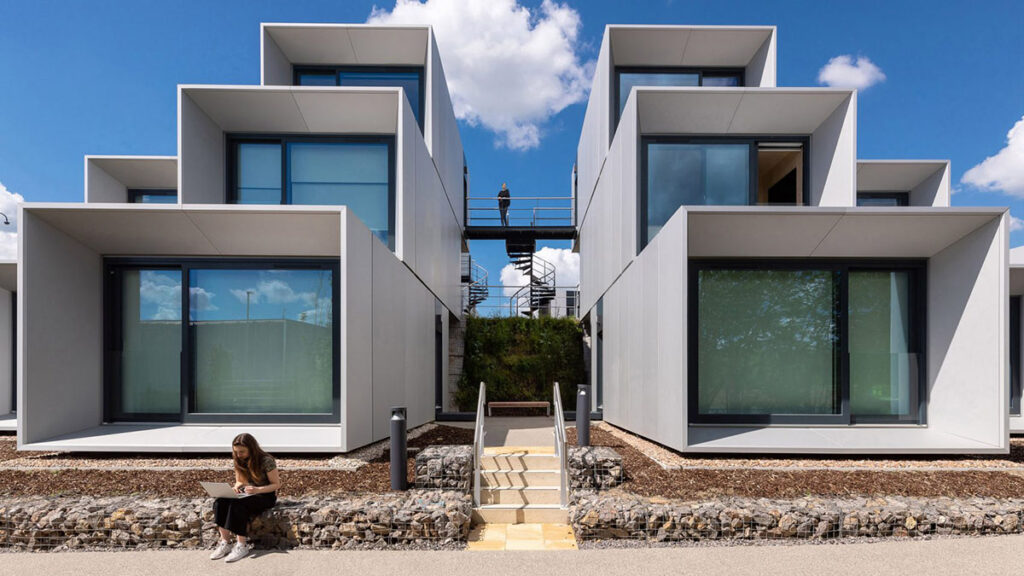
Modern Modular Homes: A Revolutionary Approach to Housing
In recent years, Modern modular homes have emerged as a revolutionary approach within the housing industry. With their innovative design and efficient construction process, these homes are gaining popularity among homeowners worldwide. In this article, we will explore how these homes redefine living spaces and why they are particularly appealing to home enthusiasts.

The Rise of Modular Homes
The concept of modular homes has evolved significantly over the years. Originally introduced as temporary housing solutions, they have now become permanent and sustainable living options. The modern adaptation of traditional modular homes reflects a growing trend towards affordability, efficiency, and customization opportunities.
What Are Modern Modular Homes?
Modern modular homes are prefabricated structures built using modules or sections. These modules are fabricated in controlled factory environments before being transported to the site for assembly. The streamlined process allows for precise construction quality and reduced on-site labor time.
Features of Modern Modular Homes
Several features distinguish modular homes from conventional housing models:
- Sustainability: Using eco-friendly materials ensures minimal environmental impact.
- Customizability: Roof styles, floor plans, and interior features can be customized to fit individual preferences.
- Energy Efficiency: Enhanced insulation standards contribute to lower energy consumption.
- Cost-effectiveness: The efficient production line reduces labor costs and construction time, resulting in savings for homeowners.
Why Choose Modern Modular Homes?
The benefits of Modern modular homes are countless, providing unmatched convenience and innovative living spaces. Crucial advantages include:
Affordability and Efficiency
Modular homes are often more affordable than traditional houses, offering a cost-effective solution for homeowners. Their construction process consumes significantly less time, which further reduces the expenses associated with on-site construction.
Design and Customization
The ability to choose from a wide range of designs and floor plans remains one of the most attractive aspects of Modern modular homes. Homeowners can personalize their home to better suit their lifestyle and aesthetic preferences.
Sustainability and Energy Efficiency
With a focus on sustainability, Modular homes are designed to reduce resource consumption and minimize waste. Many manufacturers include energy-efficient appliances and sustainable building materials, making these homes environmentally friendly.
How Are Modern Modular Homes Constructed?
The construction of Modern modular homes involves several phases:
Design and Planning
Initial design and planning are crucial elements allowing homeowners to tailor their home accordingly. During this phase, detailed blueprints and specifications are drawn up before entering production.
Off-site Fabrication
Modules are built in climate-controlled factories, ensuring no weather-related delays or issues. This stage utilizes efficient assembly-line techniques and high standards of quality control.
Transportation and Assembly
Once completed, the modules are transported to the site where they will be joined together to form a complete structure. This final stage involves minimal on-site workforce involvement and significantly speeds up the overall timeline.
Comparing Modern Modular to Traditional Homes
The differences between Modern modular homes and traditional houses extend beyond construction methodology. Here is why many find modular options preferable:
Time-Saving Solutions
The average modular build timeline is notably shorter, primarily due to the controlled environment in which they are manufactured. This contrasts sharply with traditional construction methods constrained by potential weather-related setbacks.
Financial Incentives
Affordability is key when it comes to modular homes, as cost savings stem from shorter building periods and efficient use of materials.
Adaptability and Flexibility
Modern modular homes allow changes to be made easily during the design and fabrication stages, unlike standard homes which demand labor-intensive alterations post-construction.
Potential Drawbacks to Consider
While the popularity and advantages of Modern modular homes are clear, certain limitations remain:
Resale Concerns
Due to outdated stigmas associated with prefab housing, some buyers may harbor misconceptions, albeit without just cause. However, as knowledge spreads about the many benefits modular homes offer, market perception is gradually shifting.
Limited Land Use Opportunities
Zoning restrictions could potentially impact the placement of Modern modular homes, so it’s essential to investigate local building codes early in the planning process.
Future Trends and Developments
The demand for Modern modular homes continues to grow as technological advancements refine their features and efficiencies:
Smart Home Integration
As homeowners seek enhanced connectivity solutions, modular homes will increasingly incorporate cutting-edge smart home technologies into everyday living.
Expansion Beyond Residential Settings
The adaptable nature of modular construction has applications beyond residences. Businesses, educational institutions, and government agencies are using modular structures for their own specific needs and purposes.
Conclusion
Modern modular homes offer an appealing and versatile housing solution for contemporary living. With numerous advantages including sustainability, affordability, and customization, they represent a forward-thinking approach to home ownership. Whether opting for modular homes remains a lengthy decision, informed research and consultation with professionals will help determine if this housing style aligns with individual goals.

FAQs
What materials are generally used in modern modular homes?
Modern modular homes often use innovative and eco-friendly materials, such as recycled steel and sustainably harvested wood. For more on the principles behind these materials, you can visit this helpful guide.
Are modular homes sustainable and eco-friendly?
Yes, modular homes are designed with sustainability in mind, often featuring energy-efficient appliances and sustainable building materials.
How long does it typically take to construct a modern modular home?
The construction time can vary based on design complexity but is usually shorter than traditional homes, typically taking a few months from design initiation to installation.
For further insights into the world of modular construction, you might explore other topics such as this detailed explanation on modular buildings or consider reading helpful articles on incorporating smart systems like [this irrigation overview](https://thegoodhome.org/how-to-install-an-irrigation-system-in-your-yard-2/) as an essential part of your modular setup.
This article contains affiliate links. We may earn a commission at no extra cost to you.